Table of Contents
ToggleIntroduction to the Online Learning Revolution in 2024
In 2024, online learning continues to redefine education, opening doors for millions worldwide. Gone are the days when traditional classrooms were the sole gateways to knowledge. Today, online learning platforms offer unparalleled flexibility, enabling learners to gain new skills, earn certifications, or even pivot careers from the comfort of their homes. These platforms are reshaping industries, from tech to healthcare, as they provide a level of convenience and accessibility that brick-and-mortar institutions struggle to match.
Why Online Learning Platforms Are Gaining Popularity
The rise in demand for online learning stems from several factors. The shift toward remote work, the fast pace of technological advancements, and the need for continuous skill development have all contributed to its surge in popularity. Additionally, online platforms offer tailored learning experiences, allowing students to learn at their own pace and choose specific courses relevant to their professional or personal interests. This freedom, combined with the global reach of the internet, makes online education an attractive option for learners worldwide.
Top Benefits of Using Online Learning Platforms
Flexibility and Convenience:
Online learning platforms allow learners to study anytime, anywhere. Whether you’re a working professional, a stay-at-home parent, or a student juggling multiple responsibilities, these platforms provide the flexibility to fit learning into your schedule.
Wide Variety of Courses:
From programming to music theory, online platforms offer an extensive range of subjects. Learners can explore interests outside their fields or gain specialized knowledge without enrolling in a formal degree program.
Affordable Learning:
Compared to traditional institutions, online platforms often provide affordable learning solutions. Many offer free courses, while others follow subscription models, allowing access to a vast catalog for a single fee.
Personalized Learning Paths:
With adaptive learning algorithms and customizable course selections, online platforms tailor content to each learner’s pace and preferences, ensuring a more engaging and effective learning experience.
How to Choose the Best Online Learning Platform for Your Goals
Choosing the right online learning platform can be overwhelming given the multitude of options. Here are some factors to consider:
- Course Offerings: Ensure the platform provides courses in your area of interest.
- Certification and Accreditation: If you’re pursuing credentials, choose platforms that offer recognized certifications.
- Pricing Structure: Decide between free, pay-per-course, or subscription models based on your budget.
- Learning Style Compatibility: Look for platforms that align with your learning style, whether video tutorials, reading materials, or hands-on projects.
- Instructor Quality and Support: Platforms with highly rated instructors and active student support communities enhance the learning experience.
Difference Between Online Learning Platforms and Learning Management Systems (LMS)
While the terms “online learning platforms” and “learning management systems” (LMS) are sometimes used interchangeably, they serve different purposes:
- Online Learning Platforms cater to individual learners, offering courses directly to the public. Examples include Coursera, Udemy, and LinkedIn Learning. They’re primarily content providers where learners can choose individual courses or programs.
- Learning Management Systems (LMS) are typically used by institutions, organizations, or businesses to deliver training and manage employee or student progress. LMS platforms, such as Moodle or Blackboard, focus on internal training, tracking, and assessment, and are often not open to the general public.
Hidden Gems: 20 Best Online Learning Platforms You Probably Didn’t Know in 2024
In a sea of popular platforms like Coursera or Udemy, several lesser-known but exceptional platforms have emerged. Here’s a curated list of hidden gems for 2024:
- Teachable
- MasterClass
- Skillshare
- edX
- Kajabi
- FutureLearn
- Pluralsight
- Treehouse
- Podia
- CreativeLive
- Thinkific
- LearnWorlds
- 360Learning
- Datacamp
- LinkedIn Learning
- Udacity
- Domestika
- GoSkills
- Simplilearn
- Shaw Academy
These platforms offer a mix of practical skills, creative arts, business courses, and technology training that make them perfect for various learners.
1. Teachable
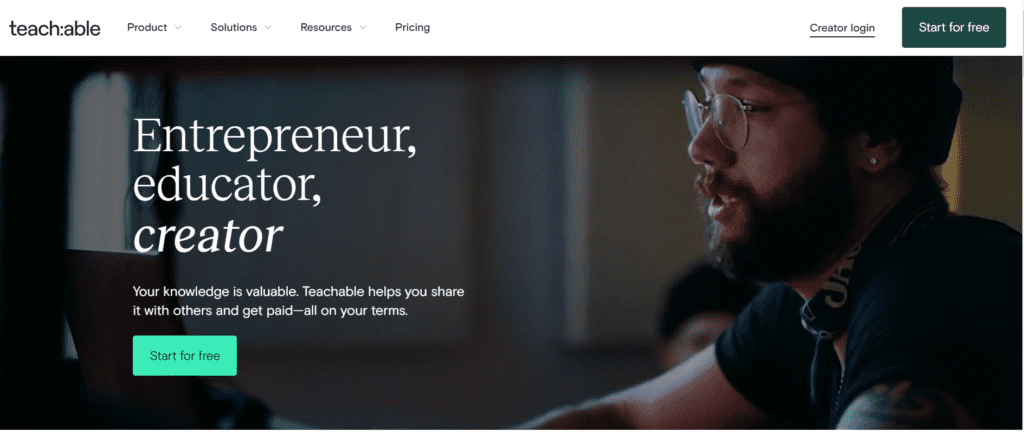
Pros:
- Easy-to-use course creation tools.
- Supports multiple content formats (videos, quizzes, etc.).
- No transaction fees on paid plans.
- Full control over pricing and user data.
- Excellent marketing and sales features for course creators.
Cons:
- Transaction fees on free plans.
- Limited free-tier features.
- Lacks advanced community-building tools.
2. MasterClass
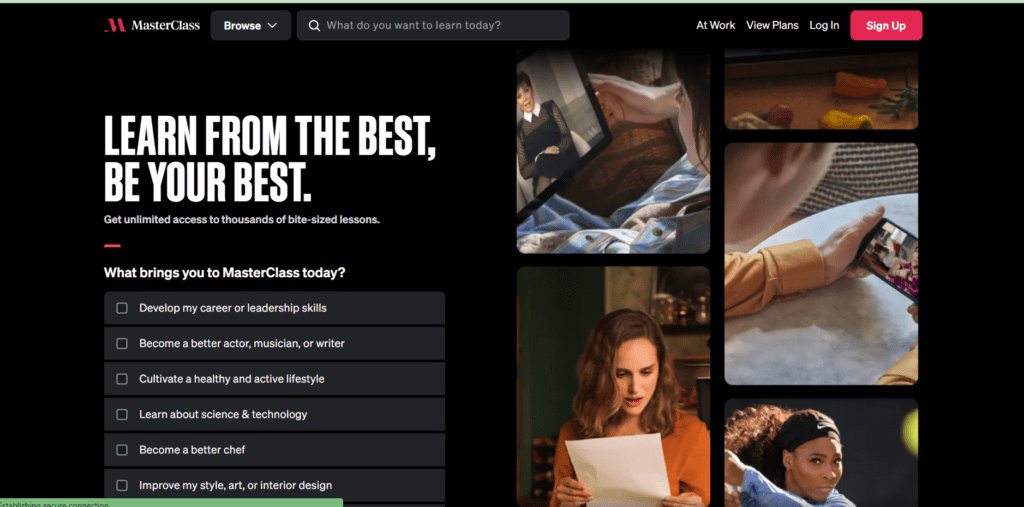
Pros:
- High-quality production value.
- Courses taught by celebrities and industry experts.
- Engaging content across various creative fields.
- Annual subscription allows access to all courses.
Cons:
- Lacks practical assignments or feedback mechanisms.
- No certification or formal educational value.
- More entertainment-focused than deep learning.
3. Skillshare
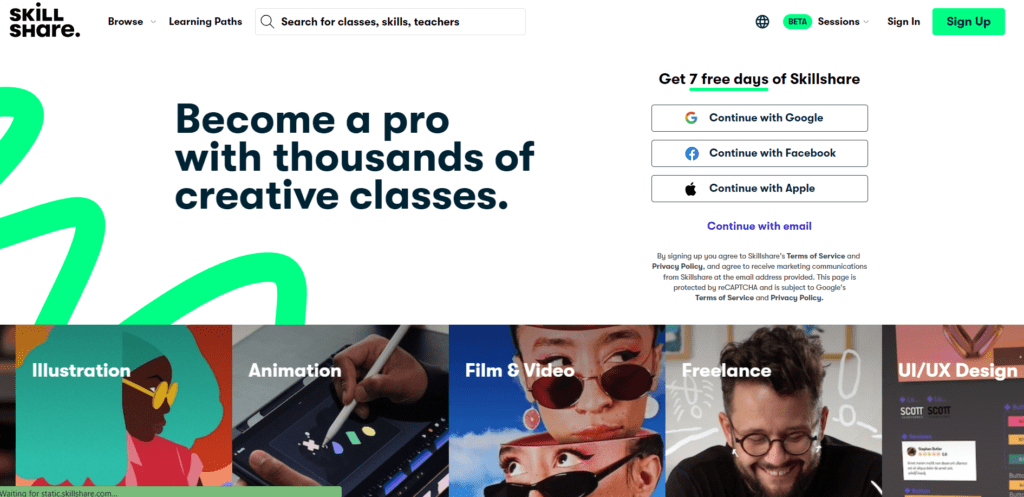
Pros:
- Affordable subscription model with access to all courses.
- Focus on creative skills (design, art, photography, etc.).
- Active community of learners and creators.
- Project-based learning encourages creativity.
Cons:
- Courses vary in quality.
- No accredited certifications.
- Limited offerings for technical or academic subjects.
4. edX
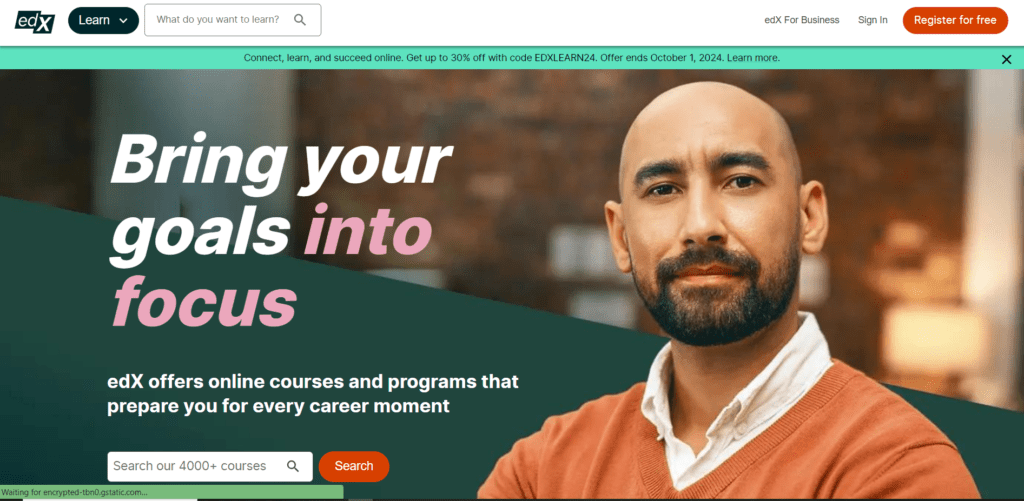
Pros:
- Partnered with top universities (Harvard, MIT, etc.).
- Free access to many courses (audit).
- Accredited certifications available for a fee.
- Wide range of subjects, including academic and professional courses.
Cons:
- Certificates can be expensive.
- Courses may require substantial time commitments.
- Limited instructor interaction in free versions.
5. Kajabi
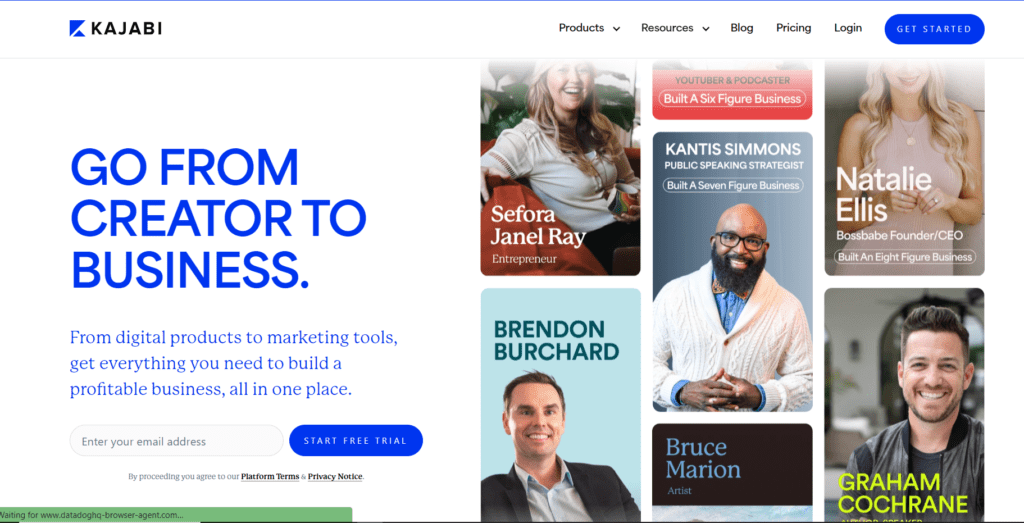
Pros:
- All-in-one platform for course creation, marketing, and selling.
- Excellent customization options for branding.
- Provides email marketing, landing pages, and automation tools.
- No transaction fees on sales.
Cons:
- Expensive monthly subscription.
- May have a steep learning curve for beginners.
- Lacks a course marketplace (no existing audience).
6. FutureLearn
Pros:
- Partnered with leading universities and institutions.
- Free access to many courses (audit).
- Focus on professional and academic courses.
- Offers micro-credentials and degrees.
Cons:
- Certificate costs can be high.
- Courses may have fixed start dates, limiting flexibility.
- Limited course catalog compared to some competitors.
7. Pluralsight
Pros:
- Focus on tech and IT skills (coding, software development).
- Offers assessments to tailor learning paths.
- Regularly updated content on cutting-edge technology.
- Business-focused features for team learning.
Cons:
- Expensive for individual learners.
- Subscription-based, which can be costly if you only need a few courses.
- No free access without a trial.
8. Treehouse
Pros:
- Focused on web development, coding, and tech skills.
- Interactive, project-based learning.
- Affordable monthly subscription.
- Active community and strong support for learners.
Cons:
- Limited to tech and coding subjects.
- No accredited certifications.
- Some learners report that content could be more challenging.
9. Podia
Pros:
- All-in-one platform for selling courses, memberships, and digital products.
- No transaction fees.
- User-friendly interface and affordable pricing.
- Built-in marketing tools (email, messaging, etc.).
Cons:
- Limited in terms of advanced course-building features.
- No course marketplace (you need to bring your own audience).
- Fewer customization options compared to competitors like Kajabi.
10. CreativeLive
Pros:
- Focus on creative and lifestyle topics (photography, music, art).
- Offers live-streamed classes for free.
- High-quality video production.
- Well-known experts and industry professionals.
Cons:
- Expensive individual courses.
- Limited interaction with instructors.
- Courses not as structured for deep skill-building.
11. Thinkific
Pros:
- Easy-to-use platform for course creation and selling.
- No transaction fees.
- Free plan available with essential features.
- Strong customer support and community.
Cons:
- No built-in course marketplace.
- Some advanced features only available on higher-tier plans.
- Basic marketing tools compared to platforms like Kajabi.
12. LearnWorlds
Pros:
- Highly customizable course creation tools.
- Supports interactive content (quizzes, video annotations, etc.).
- Advanced gamification features.
- Strong focus on learner engagement.
Cons:
- Limited free plan.
- More complex interface compared to other platforms.
- Can get expensive for advanced features.
13. 360Learning
Pros:
- Focus on collaborative and social learning.
- Built-in tools for peer feedback and group projects.
- Strong analytics and reporting features.
- Excellent for corporate training.
Cons:
- Primarily designed for business training, less suited for individual creators.
- Pricing not transparent; requires a quote.
- Limited creative subjects.
14. Datacamp
Pros:
- Focused on data science and analytics.
- Interactive coding environment within the platform.
- Clear learning paths for specific skills.
- Affordable subscription for individuals.
Cons:
- Limited to data-related subjects.
- Not as comprehensive for advanced learners.
- No formal accreditation for certifications.
15. LinkedIn Learning
Pros:
- Huge library of courses covering various professional skills.
- Integration with LinkedIn profiles for showcasing certifications.
- Free access with LinkedIn Premium subscription.
- Business-focused learning paths for employee upskilling.
Cons:
- Courses can be broad and less detailed.
- Limited interaction with instructors.
- No standalone free courses outside of trials or LinkedIn Premium.
16. Udacity
Pros:
- Focused on in-demand tech skills (AI, data science, programming).
- Partnered with industry leaders like Google and Microsoft.
- Offers “Nanodegree” programs for skill mastery.
- Hands-on projects and career services.
Cons:
- Expensive compared to other platforms.
- Limited to tech-focused subjects.
- Requires significant time commitment.
17. Domestika
Pros:
- Focus on creative arts and crafts.
- High-quality video production and expert instructors.
- Affordable pricing with frequent discounts.
- Community-driven with opportunities for interaction.
Cons:
- Courses primarily in Spanish, though many offer subtitles.
- No accredited certifications.
- Limited professional or academic topics.
18. GoSkills
Pros:
- Focus on business skills and professional development.
- Bite-sized courses with practical exercises.
- Affordable subscription model.
- Courses with certifications and CEUs (Continuing Education Units).
Cons:
- Limited course catalog compared to larger platforms.
- Focuses mainly on entry-level and mid-career skills.
- No accredited degrees or higher-level certifications.
19. Simplilearn
Pros:
- Focused on IT, business, and digital marketing.
- Offers bootcamp-style courses for immersive learning.
- Partnered with universities and industry leaders for certification.
- Hands-on projects and access to labs for practical experience.
Cons:
- Expensive, especially for advanced certifications.
- Focus is mainly on professionals looking to upskill.
- Limited creative or soft skills subjects.
20. Shaw Academy
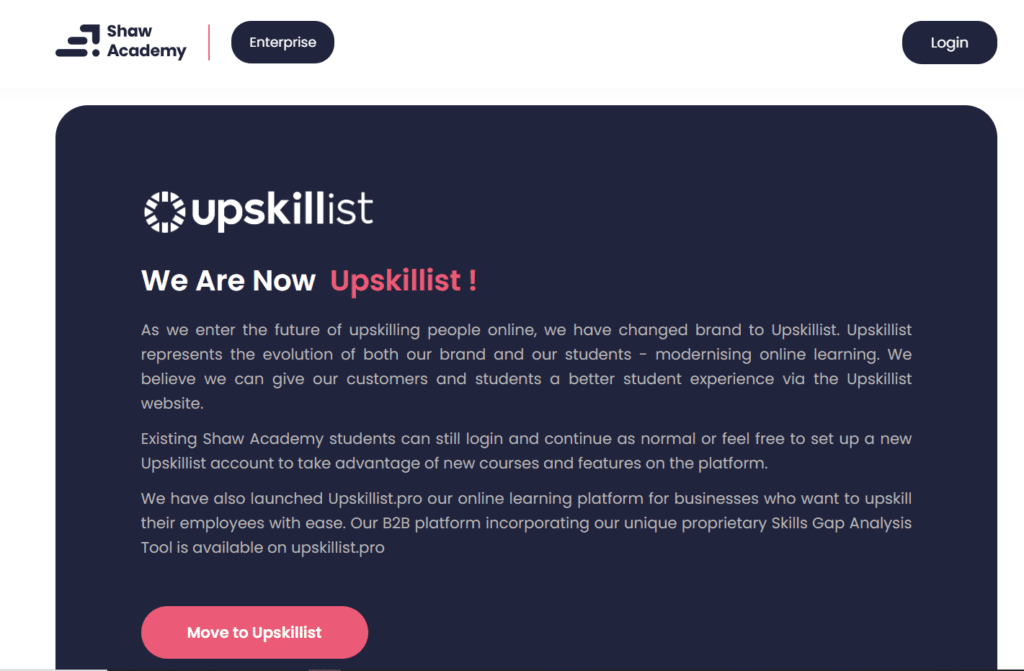
Pros:
- Wide range of subjects from business to photography.
- Offers diplomas and certifications.
- Affordable pricing with access to multiple courses.
- Interactive live classes with downloadable materials.
Cons:
- Mixed reviews about customer service and billing practices.
- Limited accreditation for certifications.
- Some courses feel less in-depth compared to competitors.
Free vs. Paid Online Learning Platforms: Which Should You Choose?
Free Platforms often offer introductory courses or limited access to materials. They are great for exploring new topics or hobbies without financial commitment. However, the depth and interactivity of free courses can be limited.
Paid Platforms tend to offer more structured learning paths, graded assignments, and access to experts. For those looking to develop a career or gain certifications, investing in a paid platform can provide a more comprehensive and valuable experience.
Ultimately, the choice depends on your goals. For casual learning, free platforms may suffice. For career advancement, paid platforms offer better resources and support.
Online Learning Platforms for Specialized Skills
For those looking to acquire niche skills, specialized platforms offer targeted learning experiences:
- Pluralsight for IT and software development.
- CreativeLive for photography and design.
- Treehouse for web development.
- Datacamp for data science and analytics.
These platforms are tailored for specific industries, offering in-depth knowledge and hands-on projects to build real-world skills.
How to Monetize Your Expertise on Online Learning Platforms
If you have valuable skills to share, you can monetize your expertise by creating and selling courses on platforms like:
- Teachable and Podia allow course creators to host and sell their content directly to students.
- Udemy offers a marketplace model where instructors earn revenue through course sales.
- Kajabi is an all-in-one platform for building online courses, memberships, and coaching programs.
To succeed, focus on creating high-quality content, marketing your courses effectively, and engaging with your learners.
Success Stories: Professionals Who Found Success via Online Learning
Many professionals have successfully pivoted or advanced their careers through online learning. For example:
- David Kim, a software engineer, transitioned from a completely unrelated field by completing several courses on Udacity.
- Sara Blake, a digital artist, gained international recognition after learning advanced design techniques on Skillshare.
- Raj Patel, a data analyst, improved his skills through Coursera, helping him secure a promotion.
These stories showcase the transformative power of online learning platforms.
Online Learning Platforms with Accredited Certifications
Accredited certifications can be critical for career growth. Platforms like edX, Coursera, and Udacity partner with leading universities and institutions to offer credentials recognized by employers. These certifications can help boost your resume and demonstrate your expertise in a particular field.
Top Platforms for Interactive Learning: Gamification, VR, and AI in Education
As technology advances, some platforms incorporate gamification, virtual reality, and AI-driven learning to enhance engagement. Platforms like Kahoot!, Coursera, and FutureLearn use AI to personalize learning and increase retention. Immersive platforms like VR Skill School offer hands-on experience in simulated environments, making learning more interactive and enjoyable.
Which Online Learning Platforms Offer the Best Community Support?
Learning communities foster collaboration and engagement. Platforms like Skillshare and MasterClass offer active communities where learners can share projects, receive feedback, and network with peers. Udemy and LinkedIn Learning also provide discussion forums and direct access to instructors.

Mobile-Friendly Learning: Platforms with the Best Mobile Apps for On-the-Go Learning
Mobile-friendly platforms are essential for learners on the go. Platforms like Coursera, LinkedIn Learning, and Khan Academy offer well-designed mobile apps, allowing learners to access course materials, watch videos, and track progress anytime, anywhere.
Corporate Training Platforms: Best Choices for Employee Upskilling in 2024
For businesses looking to upskill employees, platforms like LinkedIn Learning, Udemy for Business, and Pluralsight offer tailored corporate training solutions. These platforms allow businesses to track employee progress, assign courses, and develop skills that align with company goals.
Cost Comparison: How Do the Top Online Learning Platforms Stack Up?
Pricing varies significantly across platforms. Udemy often offers deep discounts on individual courses, while LinkedIn Learning and Skillshare offer subscription-based models. Platforms like edX and Coursera allow learners to audit courses for free but charge for certificates. It’s essential to weigh the costs against the value of the content, especially for long-term learning goals.
Platforms with the Fastest-Growing Course Catalogs in 2024
Platforms like Udemy, Skillshare, and FutureLearn are rapidly expanding their course catalogs in 2024. With new topics and specializations emerging, learners have access to cutting-edge knowledge in areas like AI, blockchain, and digital marketing.
Future-Proof Your Career: Best Online Learning Platforms for Emerging Technologies
As technology continues to evolve, platforms like Udacity (for AI, data science, and autonomous systems) and Pluralsight (for cybersecurity, cloud computing, and software development) offer the best opportunities to future-proof your career. These platforms are ahead of the curve in offering up-to-date content on emerging technologies.
The Role of Online Learning Platforms in Global Education Access
Online learning platforms are making education accessible to underserved populations worldwide. Platforms like edX, Coursera, and Khan Academy are leading efforts to democratize education by offering free or affordable courses to learners in developing countries. This democratization helps bridge the gap between privileged and disadvantaged learners, creating a more level playing field.
Conclusion: Choosing the Best Platform to Meet Your Learning or Teaching Goals
With the wide variety of online learning platforms available, it’s essential to align your platform choice with your goals. Whether you’re looking to upskill, switch careers, or simply explore a new hobby, choosing the right platform can make all the difference. For content creators, selecting a platform that supports effective course delivery, marketing, and monetization will set you on the path to success.
Feel free to share this article using the social media handles below



